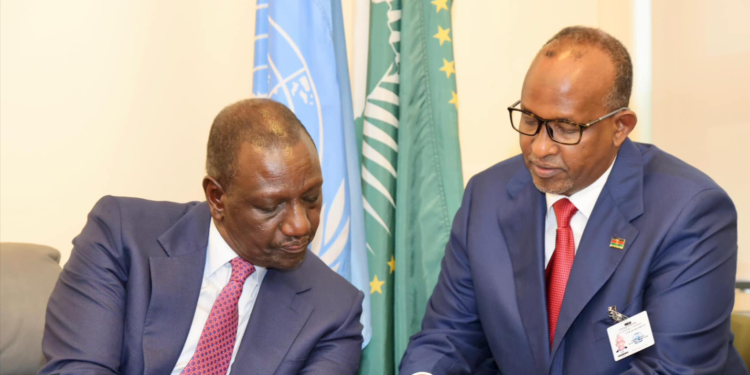Environment Cabinet Secretary Aden Duale described President William Ruto’s administration as “the most accessible” government he has worked with, even as he defended the president’s recent initiatives against criticism in an interview aired Wednesday on Citizen TV.
Duale tackled controversies surrounding Ruto’s signature policies, rebuffed calls for term extensions, and provided updates on Kenya’s environmental priorities.
Duale, who has served in various government roles over two decades, hailed Ruto’s inclusive style of governance, contrasting it with that of previous presidents Mwai Kibaki and Uhuru Kenyatta. “Ruto listens to every member of his cabinet,” Duale said, adding that the president frequently calls on ministers to “convince” him with facts. “If you convince me, I agree with you. If I convince you, you agree with me,” Duale recounted, noting that the president encourages debate within his team, fostering an environment of open dialogue.
Ruto’s administration currently faces intense scrutiny over economic policies, national reforms, and proposed changes to Kenya’s governance structure. One of the most debated issues is a proposal from a member of Ruto’s United Democratic Alliance (UDA) to extend the presidential term limit from five to seven years. Duale dismissed the idea outright, calling it a “non-starter” that lacks political support and would struggle to pass even initial legislative readings. “Kenyans should not bother about that,” he stated confidently. “It won’t even reach the second reading.”
The Cabinet Secretary explained that such a move would require a constitutional referendum, something unlikely given the legal and procedural barriers. “He needs 23 votes in the Senate, and he won’t even get 10,” Duale said, pointing to internal resistance within the ruling party. He urged lawmakers to “focus on bills of real value to the nation,” cautioning against populist agendas.
Beyond politics, Duale highlighted several of Ruto’s high-profile initiatives, some of which have faced public skepticism. One example is the “Hustler Fund,” a microcredit scheme aimed at empowering young entrepreneurs. Initially launched with the promise of stimulating small-scale businesses, the fund has encountered difficulties as many young people default on their loans. Despite the criticism, Duale defended the fund’s impact, arguing that it has “created serious entrepreneurs” and “lifted millions from the credit blacklist” by granting financial access to previously excluded segments.
“The Hustler Fund has allowed young people who couldn’t borrow even KES 500 before to start their own businesses,” Duale asserted. He also took aim at what he called “negative forces” trying to derail the administration’s progress. “Let’s not create negative forces. The president has made it clear we should focus on the positives and be proud of our country,” he said, referring to recent remarks by Ruto calling for unity and a positive outlook among Kenyans.
Duale also provided an update on Kenya’s environmental efforts, where he holds direct responsibility. Responding to questions about health hazards associated with asbestos roofing, he confirmed that the government, in partnership with the National Environment Management Authority (NEMA), is working to remove the harmful material across the country. “Asbestos causes various types of cancer, and the World Health Organization has recommended its removal,” Duale said. He noted that his office has written to key ministries, including Defense, Health, and Education, to coordinate the removal process from government buildings and private facilities.
Duale’s comments on environmental reforms extended to Kenya’s green spaces and ongoing efforts to make public parks more accessible to urban populations. He disclosed that plans are underway to expand Nairobi’s green space offerings beyond the popular Karura Forest, where monthly visitors number between 65,000 and 70,000. “We’re working with Nairobi County government to upgrade City Park and the Ngong Hills, so that more Kenyans can have access to green spaces closer to home,” he shared.
The interview also touched on the dynamics of Kenya’s relationship with the United States, following Ruto’s recent state visit to Washington. Duale noted that the bilateral ties between Kenya and the U.S. remain steady, irrespective of the outcome of next year’s American presidential election. “The relationship between Kenya and the U.S. goes beyond who is at the White House,” he stated, explaining that the partnership includes strong cooperation on security, trade, and investment. Duale acknowledged that President Ruto’s visit to the White House was a diplomatic milestone, describing it as “cementing Kenya’s role as a key ally.”
While discussing his own role, Duale spoke about the importance of loyalty in public service. A former leader in the National Assembly under both Kibaki and Kenyatta, Duale attributed his continued public service career to his “loyalty to the people of Kenya and to the Constitution.” He emphasized that his loyalty is now firmly with Ruto’s administration and expressed pride in his work within the government, highlighting the significance of his role in environmental reforms and climate change.
Reflecting on the unpredictability of public office, he recounted an anecdote from the Moi era, noting the transitory nature of government roles. “In Kenya, ministers serve at the pleasure of the president,” Duale said, describing his public service as a privilege granted by the head of state. However, he cautioned against overstepping, hinting at the importance of balancing individual interests with national priorities.
Despite political and economic challenges, he maintained that Ruto’s accessible, collaborative style of governance is one that has already achieved “80 percent” of its goals.
















